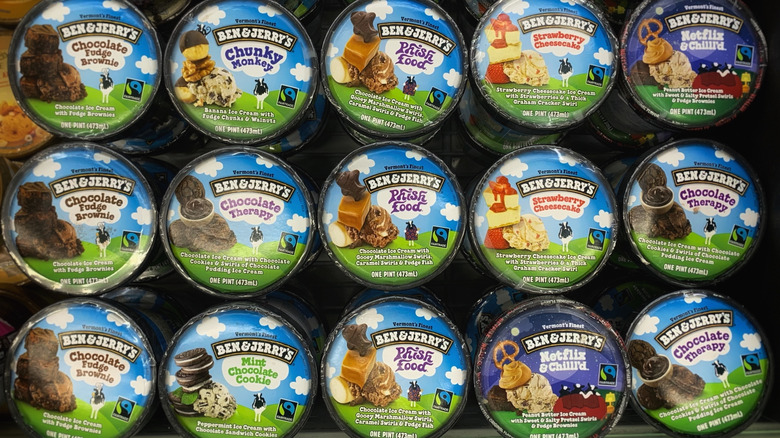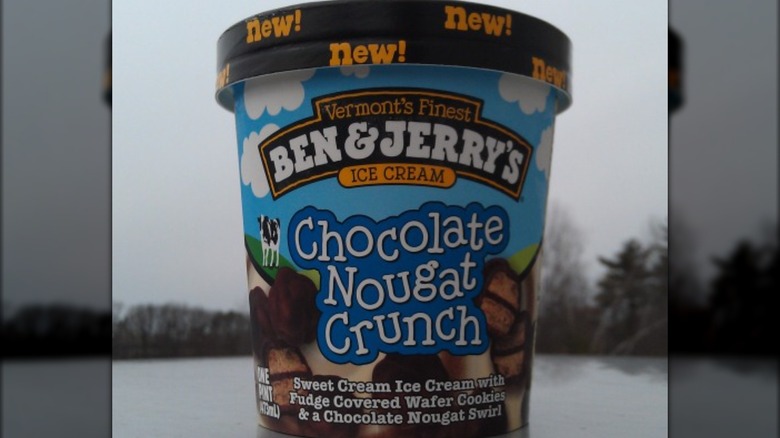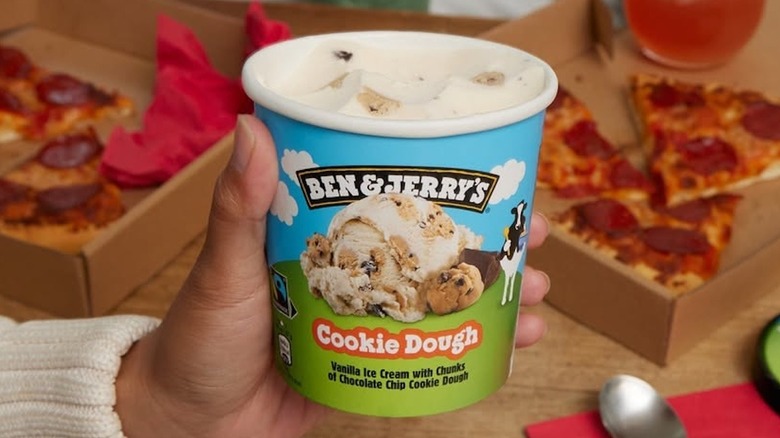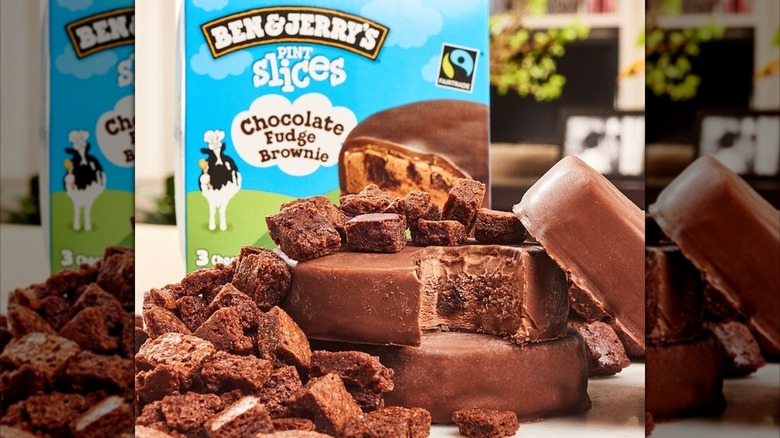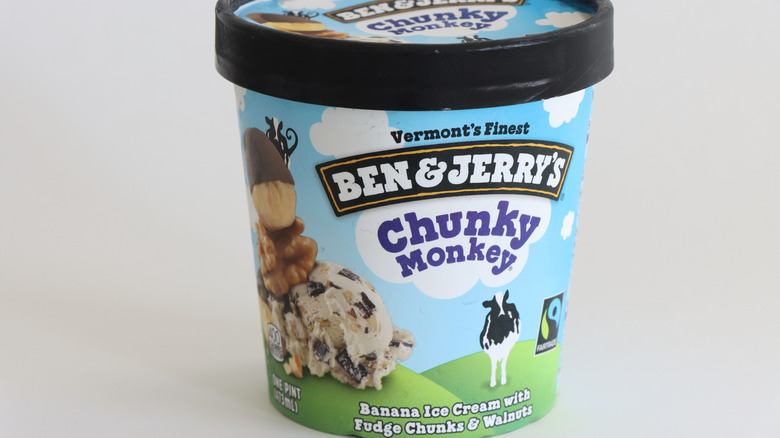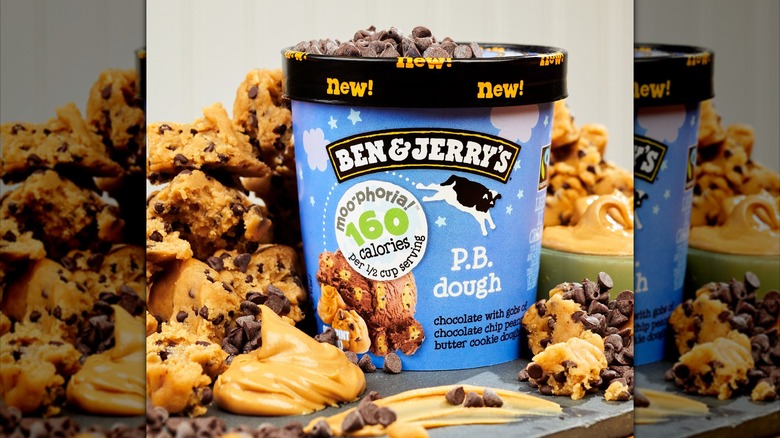The Biggest Recalls In Ben & Jerry's History
Known for its dozens of creative flavors and commitment to social causes, Ben & Jerry's has become an iconic name in the world of ice cream. But like any major food brand, the frozen treat maker has had its share of difficulties over the years. While most of the Vermont-based company's batches make it to customers' freezers without issue, there have been a few instances when its ice creams were pulled from shelves.
Initiated for reasons ranging from potential allergen contamination to concerns about foreign materials, these recalls highlighted some of the challenges that food producers face. Despite the setbacks, the brand has managed to maintain its reputation for transparency, addressing issues and implementing corrective measures. Let's take a look at some of the most significant recalls in Ben & Jerry's history and how the company responded. Such incidents show that imperfections can occur even when a company seems dedicated to product quality and caring about customers.
2012 Chocolate Nougat Crunch Recall
Any brand can face bumps in the road. In 2012, Ben & Jerry's proved that the hard way with a recall that sent ripples through its frozen treat empire. The iconic brand found itself in a sticky situation when it was forced to recall its Chocolate Nougat Crunch ice cream across the United States. The culprit was a packaging error that left out a critical allergen advisory: "Fudge-covered wafer pieces have been manufactured on shared equipment that processes peanuts and tree nuts." This oversight posed a potential risk to consumers with nut allergies. Nougat, one of the main ingredients in the flavor, is a fluffy, chewy confection traditionally made from a blend of nuts, sugar, and egg whites.
When the mistake was discovered, Unilever, Ben & Jerry's parent company, issued a voluntary recall, working closely with the U.S. Food and Drug Administration (FDA). Customers who purchased pints of Chocolate Nougat Crunch were instructed to check the date codes on the bottom of the pint and visit their local grocer with the receipt for a full refund. Luckily, no illnesses were reported as a result of the labeling lapse.
2016 Cookie Dough Recall
Most people love classic ice cream toppings — hot fudge, nuts, sprinkles, even olive oil and popcorn. Shards of metal, though? No thanks. Unfortunately, in August 2016, Ben & Jerry's had to grapple with that challenge. How exactly it happens is unclear, but the problem involved the brand's popular Cookie Dough ice cream in the U.K. A recall was issued after it was found that four batches of Cookie Dough might contain small metal fragments.
The company alerted customers of the problem and advised them to check the bottom of their tubs for the affected batch codes. Customers were also urged to discard products matching the codes out of caution. If their 500 milliliter pints were among the recalled items, they were eligible for a free replacement — a small victory in a potentially dangerous situation. Despite this metallic mishap, Cookie Dough is ranked among the most popular Ben & Jerry's ice cream flavors.
2017 Chocolate Fudge Brownie Pint Slices Recall
In May 2017, another voluntary recall occurred in the U.S. This time it involved Ben & Jerry's Chocolate Fudge Brownie Pint Slices. Parent company Unilever made the announcement just a few months after the individually wrapped, single-serving product line made its market debut. The issue arose when a consumer complained that a package of what they expected to be Chocolate Fudge Brownie Pint Slices contained Vanilla Peanut Butter Cup Pint Slices instead. While the individual slices were "correctly" labeled, the outer packaging was incorrect. The latter failed to mention peanuts as a key ingredient — a serious omission for those with peanut allergies.
The accidentally mislabeled batch, which was distributed nationwide, led Unilever to coordinate closely with the FDA for an orderly recall. Consumers were advised to stop eating the affected products and reach out to the Unilever customer care department for further instructions. No allergic reactions or illnesses were reported.
2019 Coconut Seven Layer Bar and Chunky Monkey Recall
In April 2019, Ben & Jerry's recalled two of its products in the U.S. One was the Coconut Seven Layer Bar, a non-dairy ice cream made with coconut milk, judge chunks, walnuts, graham cracker bits, and caramel. The other was Chunky Monkey, a banana-flavored ice cream with fudge chunks and walnuts. The possibility that the pints contained traces of other nuts — specifically almonds, Brazil nuts, and hazelnuts — was inadvertently omitted from the ingredient and allergy information. This posed potentially serious health risks for individuals with nut allergies. Additionally, a nut that was not identified as a walnut was discovered during production, triggering the recall.
As with previous recalls, affected products were distributed nationwide, and specific product codes and best-by dates were provided to help identify them. Unilever traced the error to one of its nut suppliers and assured the public that corrective measures had been taken. Thankfully, no allergic reactions or illnesses were reported.
2022 Moo-phoria Peanut Butter Cookie Dough Recall
In June 2022, Ben & Jerry's issued a voluntary recall for one batch of its Moo-phoria P.B. (Peanut Butter) Dough ice cream — specifically pints sold at Sainsbury's in England, Scotland, and Wales. Unfortunately, the items' lids were meant for an entirely different flavor: Salted Caramel Brownie.
Because of this packaging error, peanuts were not listed among the main ingredients on the lid, possibly putting people with peanut allergies at risk. As a result of the blunder, customers with peanut allergies were urged not to consume the ice cream, promptly return the product to Sainsbury's for a full refund, and contact Unilever U.K. for further details.
Ben & Jerry's introduced its Moo-phoria collection in February 2018 in an effort to offer lighter options with less sugar, fat, and calories than its traditional pints. However, the improperly packaged pints and the health concern they created may have left the company feeling Moo-rose.
